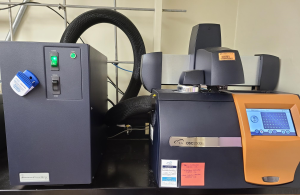
| TA Instruments | DSC Discovery 2500 |
| Temperature range | -90 – 550 °C |
| Rate | 0.1 – 100 °C/min |
| Material | 5 – 20 mg (typical) |
Differential Scanning Calorimeters (DSC) measure how heat flow changes in a material as a function of temperature change. Sample weights are measured in comparison to a reference pan, which is an empty pan of the same type housing the sample (e.g., standard aluminum or premium hermetic, see the Sample Preparation: DSC page for more information). These heat flow changes can be associated to endothermic and exothermic thermal transitions, such as glass transition temperature (Tg), melting temperature (Tm), and crystallization temperature (Tc), or changes in heat capacity (Cp) of the sample. A wide variety of samples (solids, liquids, powders, films, fibers) can be analyzed through a traditional DSC experiment or a modulated DSC experiment in temperatures ranging from -90°C to 550°C.
**Thermogravimetric analysis (TGA) is required prior to all DSC measurements to get information about the thermal stability of your sample. DSC experiments should only be performed at temperatures below the sample’s 95% decomposition temperature.